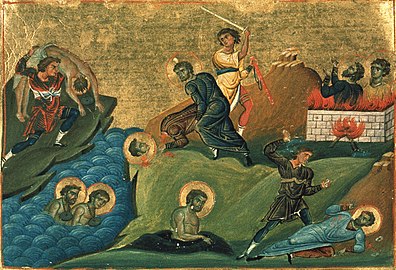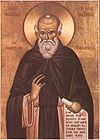September 3 (Eastern Orthodox liturgics)
Appearance

Sep. 2 - Eastern Orthodox liturgical calendar - Sep. 4
All fixed commemorations below celebrated on September 16 by Orthodox Churches on the Old Calendar.[note 1]
For September 3rd, Orthodox Churches on the Old Calendar commemorate the Saints listed on August 21.
Saints
- Saint Phoebe, Deaconess of Cenchreae near Corinth (1st century)[1][2][3][4][note 2][note 3]
- Hieromartyr Aristion of Alexandria (Kelladion), Bishop of Alexandria Scabiosa (modern Iskenderun) (c. 167)[1][3][6][7][note 4]
- Hieromartyr Anthimus of Nicomedia, Bishop of Nicomedia (302)[1][3][8][9][note 5]
- Hieromartyr Theophilus the Deacon,[10] and martyrs Dorotheus, Mardonius, Migdonius, Peter, Indes, Gorgonius, Zeno,[11] Virgin Domna,[12][13] and Euthymius (302)[1][14][15]
- Martyr Basilissa of Nicomedia (309)[1][3][16][17][note 6]
- Martyr Zenon, immersed in a cauldron of boiling lead.[3][15][18][note 7]
- Martyr Chariton, thrown into a pit of boiling lime.[3][15][19]
- Martyr Archontius.[3][15][20]
- Venerable Theoctistus of Palestine, fellow ascetic with Venerable Euthymius the Great (451)[1][3][21][22]
- Saint Constantine the New (Heraclius Constantine), Emperor of Byzantium, in the Church of the Holy Apostles (641)[1][3][23][24]
- Saint Trivelius Theoktist (Khan Tervel of Bulgaria), who played an important role in defeating the Arabs during the Siege of Constantinople in 717–718 (721)[25][note 8]
Pre-Schism Western saints
- Saints Euphemia, Dorothy, Thecla and Erasma, a group of virgin-martyrs in Aquileia in Italy, venerated in Venice and Ravenna (1st century)[26][note 9]
- Saint Mansuetus (Mansuy), Bishop of Toul in France, Confessor (c. 350)[5][26]
- Saint Ambrose, Bishop of Sens in France (c. 455)[26]
- Saint Macanisius (Mac Nisse of Connor), the founder and first bishop-abbot of Connor (514)[26][note 10]
- Saint Auxanus (Sant'Ansano), Bishop of Milan (568)[5][26]
- Saint Maurilius, Bishop of Cahors in France (580)[26][note 11]
- Saint Natalis, a priest in Casale in Piedmont (6th century)[26]
- Saint Gregory the Great (the Dialogist), Pope of Rome (604)[26][note 12][note 13] (see also: March 12)
- Saint Remaclus, Bishop of Maastricht (c. 663)[1][27][note 14]
- Saint Frugentius, a monk at Fleury Abbey, martyred with St Aigulphus, Abbot of Lérins in France (675)[26]
- Saint Aigulphus of Provence (Ayou, Ayoul), Abbot of Lérins (c. 676)[1][26][27][note 15][note 16][note 17]
- Saint Hereswith, a princess from Northumbria in England, and sister of St Hilda, she ended her life as a nun at Chelles Abbey in France (c. 690)[26][note 18]
- Saint Regulus (Reol), a monk at Rebais in France with St Philibert, later Archbishop of Rheims and founder of the monastery of Orbais (698)[26]
- Saint Sandalus (Sandila, Sandolus, Sandulf), a martyr in Cordoba in Spain under the Moors (c. 855)[5][26]
- Saint Edward the Martyr, Martyr and King of England (978)[1][27] (see also: March 18 and February 13 - translation of relics)
Post-Schism Orthodox saints
- Saint Ioannicius II, First Serbian Patriarch, Wonderworker (1354)[1][15][27][29][note 19]
- Blessed John "the Hairy", Fool-for-Christ of Rostov (1580)[1][15][27][30][31]
- New Martyr Polydorus of Leucosia, Cyprus, at New Ephesus (1794)[1][3][15][27][32][33][note 20]
New martyrs and confessors
- New Hieromartyr Pimen (Belolikov), Bishop of Vernensk and Semirechensk (1918)[1][15][27][34][note 21]
- New Hieromartyr Meletius (Golokolosv), Hieromonk of the Issyk-Kul Holy Trinity Monastery, Kyrgyzstan (1918)[1][27][34]
- New Hieromartyrs Sergius Fenomenov, Basil Kolmikov, Philip Shatsky, and Vladimir Dmitrievsky,[35] Priests (1918)[27][34]
- New Hieromartyrs Basil Krasivsky[36] and Parthenius Krasivsky, Priests (1919)[27][34]
- New Hieromartyrs Andrew Dalnikov[37] and Theophan Sokolov, Priests (1920)[27][34]
- New Hieromartyrs Vladimir Sadovsky and Michael Sushkov, Priests (1921)[27][34]
- New Hieromartyr Nicholas Sushchevsky, Priest (1923)[27][34]
- New Hieromartyr Euthymius Krygovich,[38] Priest, and 4 martyrs with him (1924)[27][34]
- New Hieromartyr Romanus Marchenko, Priest (1929)[27][34]
- New Hieromartyr Alexis Zinoviev, Priest (1937)[15][27][34][39]
- New Hieromartyr Elias Bazhanov, Priest (1937)[27][34][40]
- New Hieromartyr Peter Sorokin, Deacon of Alma-Ata (1953)[15][27]
Other commemorations
- Icon of the Theotokos of Pisidian Sozopolis (608)[15][27][34][41]
- Repose of Priest Peter of Uglich, Fool-for-Christ (1866)[1][42][43]
- Translation of the relics (1953) of St. Nektarios (Kephalas) of Aegina, Metropolitan of Pentapolis and Wonderworker (1920)[15][43][44]
- Translation of the relics of Venerable Anthimos (Vagianos) of Chios (1960)[43][note 22]
Icon gallery
-
Hieromartyr Anthimus of Nicomedia, Bishop of Nicomedia and those with him.
-
Saint Trivelius Theoktist, Khan of Bulgaria.
-
St. Gregory the Dialogist, Pope of Rome, with St. Augustine of Canterbury.
-
St. Ioannicius II, First Serbian Patriarch.
-
New Hieromartyr Pimen (Belolikov), Bishop of Vernensk and Semirechensk.
-
St. Nektarios (Kephalas) of Aegina, Metropolitan of Pentapolis.
Notes
- ^ The notation Old Style or (OS) is sometimes used to indicate a date in the Julian Calendar (which is used by churches on the "Old Calendar").
The notation New Style or (NS), indicates a date in the Revised Julian calendar (which is used by churches on the "New Calendar"). - ^ Name days celebrated today include:
- Phoebe (Φοίβη);
- Phoebos (Φοῖβος).
- ^ "At Corinth, the birthday of St. Phoebe, mentioned by the blessed apostle Paul in his epistle to the Romans."[5]
- ^ Name days celebrated today include:
- Aristion (Ἀριστίων);
- Aristea (Ἀριστέα).
- ^ Name days celebrated today include:
- Anthimos (Ἄνθιμος).
- ^ "At Nicomedia, the martyrdom of St. Basillissa, virgin and martyr, in the persecution of Diocletian, under the governor Alexander. At the age of nine years, after having, through the power of God, overcome scourging, fire, and the beasts, she gave up her soul to her Creator in prayer."[5]
- ^ "Also, the holy martyrs Zeno and Chariton. The one was cast into a caldron of melted lead, the other into a burning furnace."[5]
- ^ See also:
- August 15 - Commemoration of the Miracle of the Theotokos at the Siege of Constantinople (717–18).
- ^ "At Aquileia, the holy virgins and martyrs Euphemia, Dorothea, Thecla, and Erasma. Under Nero, after enduring many torments, they were slain with the sword, and buried by St. Hermagoras."[5]
- ^ By tradition he was baptised as an infant by St Patrick, who later consecrated him bishop. He also founded a monastery, probably in Kells.
- ^ It is recorded that he knew the whole Bible by heart.
- ^ Born in Rome of patrician parents, he became the prefect of the city. He soon resigned the office, turned his home on the Caelian Hill into a monastery and became a monk. Next he was sent to Constantinople as apocrisarius or ambassador. On his return he was chosen Pope (590). First in importance was his mission to England. This was important not only for the conversion of England, but also for the spreading of Orthodoxy among the other Germanic peoples of north-west Europe. He also encouraged the conversion of the Lombards in Italy and the Goths in Spain, embellished the liturgy, defended and befriended monasticism and cared for the poor. He was a prolific writer; his dialogues and his Regula Pastoralis are classics of Orthodox literature.
- ^ "At Rome, the raising to the Sovereign Pontificate of St. Gregory the Great, an incomparable man, who, being forced to take that burden upon himself, sent forth from the more exalted throne brighter rays of sanctity upon the world."[5]
- ^ A noble born in Aquitaine in France, he became a monk and the first Abbot of Solignac near Limoges and then of Cougnon in Luxembourg. About the year 648 he founded the monasteries of Stavelot and Malmédy in Belgium and in 652 he became Bishop of Maastricht in the Netherlands.
- ^ Born in Blois in France, at the age of twenty he became a monk at Fleury. He was sent to Montecassino to attempt to obtain the relics of St Benedict and later became Abbot of Lérins. With four of his monks he was taken by evildoers to an island near Corsica where they were all martyred.
- ^ "The same day, the birthday of the holy martyrs Aigulphus, abbot of Lerins, and the monks, his companions, who, after their tongues were cut off, and their eyes plucked out, were killed with the sword."[5]
- ^ See: (in French) Aigulphe de Lérins. Wikipédia. (French Wikipedia).
- ^ "ST. HERESWITHA was daughter of Ereric, the nephew of St. Edwin, King of Northumbria, and sister of St. Hilda of Whitby. She was married to St. Ethelhere, who succeeded his brother Anna as King of the East Angles, but reigned only one year, being killed in the wars with Oswy in 655. Having thus become a widow, Hereswitha resolved to embrace the religious life, and for this purpose went to Chelles, at that time in the diocese of Paris. There she was professed, and faithfully persevered in her holy state until death. It was the intention of St. Hilda to have joined her sister, but before she would leave England she was recalled by St. Aidan to establish a monastery of Virgins in Northumbria. (Thomas of Ely says that Hereswitha was the wife of Anna, but there are difficulties which seem to make it impossible. Florence and Malmesbury agree that her husband was Ethelhere.).[28]
- ^ See: (in Serbian) Свети Јоаникије II. Википедију. (Serbian Wikipedia).
- ^ Name days celebrated today include:
- Polydorus (Πολύδωρος).
- ^ See: (in Russian) Пимен (Белоликов). Википедии. (Russian Wikipedia).
- ^ His feast day is on February 15.
References
- ^ a b c d e f g h i j k l m n o p September 3/September 16. Orthodox Calendar (PRAVOSLAVIE.RU).
- ^ Great Synaxaristes: (in Greek) Ἡ Ἁγία Φοίβη ἡ διακόνισσα . 3 Σεπτεμβρίου. ΜΕΓΑΣ ΣΥΝΑΞΑΡΙΣΤΗΣ.
- ^ a b c d e f g h i j (in Greek) Συναξαριστής. 3 Σεπτεμβρίου. ECCLESIA.GR. (H ΕΚΚΛΗΣΙΑ ΤΗΣ ΕΛΛΑΔΟΣ).
- ^ St Phoebe the Deaconess at Cenchreae near Corinth. OCA - Lives of the Saints.
- ^ a b c d e f g h i The Roman Martyrology. Transl. by the Archbishop of Baltimore. Last Edition, According to the Copy Printed at Rome in 1914. Revised Edition, with the Imprimatur of His Eminence Cardinal Gibbons. Baltimore: John Murphy Company, 1916. pp. 260–270.
- ^ Great Synaxaristes: (in Greek) Ὁ Ἅγιος Ἀριστίων ὁ Ἱερομάρτυρας Ἐπίσκοπος Ἀλεξανδρείας. 3 Σεπτεμβρίου. ΜΕΓΑΣ ΣΥΝΑΞΑΡΙΣΤΗΣ.
- ^ Martyr Aristion the Bishop of Alexandria. OCA - Lives of the Saints.
- ^ Great Synaxaristes: (in Greek) Ὁ Ἅγιος Ἄνθιμος ὁ Ἱερομάρτυρας Ἐπίσκοπος Νικομήδειας. 3 Σεπτεμβρίου. ΜΕΓΑΣ ΣΥΝΑΞΑΡΙΣΤΗΣ.
- ^ Hieromartyr Anthimus the Bishop of Nicomedia. OCA - Lives of the Saints.
- ^ Martyr Theophilus the Deacon of Nicomedia. OCA - Lives of the Saints.
- ^ Martyr Zeno of Nicomedia. OCA - Lives of the Saints.
- ^ "St. Domna of Nicomedia". Antiochian Orthodox Christian Archdiocese of North America. Retrieved December 17, 2016.
- ^ Virginmartyr Domna of Nicomedia. OCA - Lives of the Saints.
- ^ Martyr Dorotheus of Nicomedia. OCA - Lives of the Saints.
- ^ a b c d e f g h i j k l The Autonomous Orthodox Metropolia of Western Europe and the Americas (ROCOR). St. Hilarion Calendar of Saints for the year of our Lord 2004. St. Hilarion Press (Austin, TX). p. 65.
- ^ Great Synaxaristes: (in Greek) Ἡ Ἁγία Βασίλισσα. 3 Σεπτεμβρίου. ΜΕΓΑΣ ΣΥΝΑΞΑΡΙΣΤΗΣ.
- ^ Martyr Basilissa of Nicomedia. OCA - Lives of the Saints.
- ^ Great Synaxaristes: (in Greek) Ὁ Ἅγιος Ζήνων ὁ Μάρτυρας. 3 Σεπτεμβρίου. ΜΕΓΑΣ ΣΥΝΑΞΑΡΙΣΤΗΣ.
- ^ Great Synaxaristes: (in Greek) Ὁ Ἅγιος Χαρίτων ὁ Μάρτυρας. 3 Σεπτεμβρίου. ΜΕΓΑΣ ΣΥΝΑΞΑΡΙΣΤΗΣ.
- ^ Great Synaxaristes: (in Greek) Ὁ Ἅγιος Ἀρχοντίων ὁ Μάρτυρας. 3 Σεπτεμβρίου. ΜΕΓΑΣ ΣΥΝΑΞΑΡΙΣΤΗΣ.
- ^ Great Synaxaristes: (in Greek) Ὁ Ὅσιος Θεόκτιστος συνασκητὴς τοῦ Μεγάλου Εὐθυμίου. 3 Σεπτεμβρίου. ΜΕΓΑΣ ΣΥΝΑΞΑΡΙΣΤΗΣ.
- ^ Venerable Theoctistus. OCA - Lives of the Saints.
- ^ Great Synaxaristes: (in Greek) Ὁ Ἅγιος Κωνσταντῖνος ὁ Βασιλιὰς, ὁ Νέος ὁ ἐν τοῖς Ἁγίοις Ἀποστόλοις. 3 Σεπτεμβρίου. ΜΕΓΑΣ ΣΥΝΑΞΑΡΙΣΤΗΣ.
- ^ (in Greek) Άγιος Κωνσταντίνος ο Βασιλιάς ο νέος «ἐν τοῖς Ἁγίοις Ἀποστόλοις». Ορθόδοξος Συναξαριστής.
- ^ (in Bulgarian) Септември - 2020 година. Българска Патриаршия (http://www.bg-patriarshia.bg). Retrieved: 15 January, 2020.
- ^ a b c d e f g h i j k l m September 3. Latin Saints of the Orthodox Patriarchate of Rome.
- ^ a b c d e f g h i j k l m n o p q r s September 16 / September 3. HOLY TRINITY RUSSIAN ORTHODOX CHURCH (A parish of the Patriarchate of Moscow).
- ^ Rev. Richard Stanton. A Menology of England and Wales, or, Brief Memorials of the Ancient British and English Saints Arranged According to the Calendar, Together with the Martyrs of the 16th and 17th Centuries. London: Burns & Oates, 1892. pp. 434-435.
- ^ St Joannicius the first Serbian Patriarch. OCA - Lives of the Saints.
- ^ Great Synaxaristes: (in Greek) Ὁ Ἅγιος Ἰωάννης ὁ διὰ Χριστὸν Σαλός τοῦ Ρώστωφ. 3 Σεπτεμβρίου. ΜΕΓΑΣ ΣΥΝΑΞΑΡΙΣΤΗΣ.
- ^ Blessed John “the Hairy” and Fool-For-Christ at Rostov. OCA - Lives of the Saints.
- ^ Great Synaxaristes: (in Greek) Ὁ Ἅγιος Πολύδωρος ὁ Νεομάρτυρας. 3 Σεπτεμβρίου. ΜΕΓΑΣ ΣΥΝΑΞΑΡΙΣΤΗΣ.
- ^ Leonidas J. Papadopulos, Georgia Lizardos, et al (Transl.). "Great New Martyr Polydorus of Cyprus." In: New Martyrs of the Turkish Yoke. Seattle: St. Nectarios Press, 1985. pp. 272-281.
- ^ a b c d e f g h i j k l (in Russian) 3 сентября по старому стилю / 16 сентября по новому стилю. Русская Православная Церковь - Православный церковный календарь на 2024 год.
- ^ (in Russian) ВЛАДИМИР. Православная Энциклопедия под редакцией Патриарха Московского и всея Руси Кирилла (электронная версия). (Orthodox Encyclopedia - Pravenc.ru).
- ^ (in Russian) ВАСИЛИЙ. Православная Энциклопедия под редакцией Патриарха Московского и всея Руси Кирилла (электронная версия). (Orthodox Encyclopedia - Pravenc.ru).
- ^ (in Russian) АНДРЕЙ. Православная Энциклопедия под редакцией Патриарха Московского и всея Руси Кирилла (электронная версия). (Orthodox Encyclopedia - Pravenc.ru).
- ^ (in Russian) ЕВФИМИЙ. Православная Энциклопедия под редакцией Патриарха Московского и всея Руси Кирилла (электронная версия). (Orthodox Encyclopedia - Pravenc.ru).
- ^ (in Russian) АЛЕКСИЙ. Православная Энциклопедия под редакцией Патриарха Московского и всея Руси Кирилла (электронная версия). (Orthodox Encyclopedia - Pravenc.ru).
- ^ (in Russian) ИЛИЯ. Православная Энциклопедия под редакцией Патриарха Московского и всея Руси Кирилла (электронная версия). (Orthodox Encyclopedia - Pravenc.ru).
- ^ Icon of the Mother of God of Pisidia. OCA - Lives of the Saints.
- ^ Great Synaxaristes: (in Greek) Ὁ Ἅγιος Πέτρος ὁ διὰ Χριστὸν Σαλός τοῦ Οὔγγλις, Ἱερεὺς (Ρῶσος). 3 Σεπτεμβρίου. ΜΕΓΑΣ ΣΥΝΑΞΑΡΙΣΤΗΣ.
- ^ a b c (in Greek) 03/09/2024. Ορθόδοξος Συναξαριστής.
- ^ Great Synaxaristes: (in Greek) Ἀνακομιδὴ Τιμίων Λειψάνων Ἁγίου Νεκταρίου Πενταπόλεως τοῦ Θαυματουργοῦ. 3 Σεπτεμβρίου. ΜΕΓΑΣ ΣΥΝΑΞΑΡΙΣΤΗΣ.
Sources
- September 3/September 16. Orthodox Calendar (PRAVOSLAVIE.RU).
- September 16 / September 3. HOLY TRINITY RUSSIAN ORTHODOX CHURCH (A parish of the Patriarchate of Moscow).
- September 3. OCA - The Lives of the Saints.
- The Autonomous Orthodox Metropolia of Western Europe and the Americas (ROCOR). St. Hilarion Calendar of Saints for the year of our Lord 2004. St. Hilarion Press (Austin, TX). p. 65.
- The Third Day of the Month of September. Orthodoxy in China.
- September 3. Latin Saints of the Orthodox Patriarchate of Rome.
- The Roman Martyrology. Transl. by the Archbishop of Baltimore. Last Edition, According to the Copy Printed at Rome in 1914. Revised Edition, with the Imprimatur of His Eminence Cardinal Gibbons. Baltimore: John Murphy Company, 1916. pp. 269–270.
- Rev. Richard Stanton. A Menology of England and Wales, or, Brief Memorials of the Ancient British and English Saints Arranged According to the Calendar, Together with the Martyrs of the 16th and 17th Centuries. London: Burns & Oates, 1892. pp. 434–435.
- Greek Sources
- Great Synaxaristes: (in Greek) 3 ΣΕΠΤΕΜΒΡΙΟΥ. ΜΕΓΑΣ ΣΥΝΑΞΑΡΙΣΤΗΣ.
- (in Greek) Συναξαριστής. 3 Σεπτεμβρίου. ECCLESIA.GR. (H ΕΚΚΛΗΣΙΑ ΤΗΣ ΕΛΛΑΔΟΣ).
- (in Greek) 03/09/2024. Ορθόδοξος Συναξαριστής.
- Russian Sources
- (in Russian) 16 сентября (3 сентября). Православная Энциклопедия под редакцией Патриарха Московского и всея Руси Кирилла (электронная версия). (Orthodox Encyclopedia - Pravenc.ru).
- (in Russian) 3 сентября по старому стилю / 16 сентября по новому стилю. Русская Православная Церковь - Православный церковный календарь на 2024 год.







